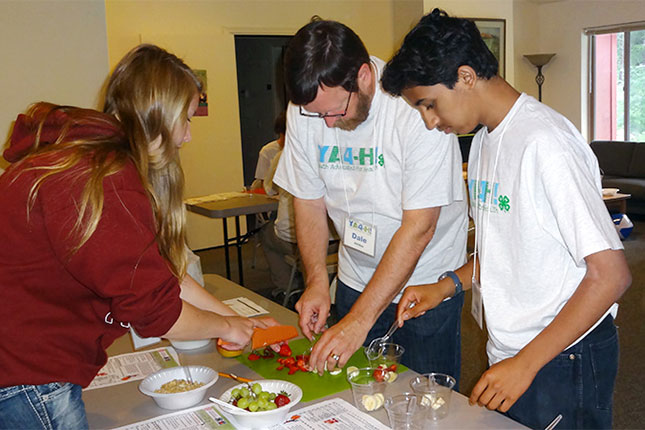Youth Advocates for Health
Issue
Adolescent obesity rates in the United States have more than doubled over the last four decades (Lobstein et al., 2015). In Washington state, nearly one out of three 10th and 12th Graders are overweight or obese. Poor physical activity and nutrition behaviors directly contribute to high weight status. Less than a quarter of WA state teens meet daily physical activity guidelines and only one in five eat five or more fruits or vegetables per day (Washington State Healthy Youth Survey, 2016). Long-term, adolescent overweight and obesity may result in chronic health conditions and costly health care needs.
Response
One promising approach to promoting healthy nutrition knowledge and behavior in adolescence is using teens as teachers. As a teen teacher, teens take a leadership role in teaching younger children. Given this, Washington State University Extension implemented the Youth Advocates for Health (YA4-H!) program. YA4-H! (originally developed by Oregon State University; Flesch, Lile, & Arnold, 2015) is a statewide program to increase nutrition knowledge and promote healthy nutrition behavior in children and adolescents ages 8 to 18 years old.
Specifically, YA4-H! trains teens as teachers and advocates for health in partnership with adult mentors to teach nutrition skills to children. In addition to improving nutrition outcomes for children, YA4-H! promotes positive youth development, builds healthy youth-adult partnerships, and facilitates internalization of curriculum content in teen teachers.
The YA4-H! model uses a three-step implementation model including:
- Initial training with a 12-hour, statewide ‘train the trainer’ event for teen teachers and their adult partners
- Ongoing recruitment and training of additional teen teachers and partners at the local level
- Implementation of selected curriculum, in our case, Choose Health Food, Fun, Fitness nutrition curriculum (Cornell University, 2014).
Since its inception in 2013, YA4-H! has trained approximately 300 teens to teach a nutrition curriculum to over 10,000 children in 17 counties across Washington state.
By The Numbers
Teen Teachers reported
Positive Youth Development outcomes of:
- 96% reported increased self-confidence
- 100% reported increased communication and leadership skills
- 91% reported greater teaching skills
Nutrition knowledge and behavior outcomes of:
- 98% reported learning how to make healthy food choices
- 100% reported learning the importance of eating a healthy diet
- 100% reported eating more fruits and vegetables



Impacts
Before starting the program, teen teachers consistently reported being unsure of their knowledge, skills, and abilities to teach younger youth. However, the results showed a pattern of improved health knowledge, self-perception, and increased skills/abilities such as communicating with others and public speaking. Data also show teen teachers reported increases in positive youth development constructs (e.g., pro-social values, future orientation, contribution to others) after participating.
Participants consistently reported that because of their YA4-H! experience, they view themselves as leaders, mentors, and people who can help others. Evaluation of the program shows teen teachers’ levels of comfort, confidence, and teaching skills increased.
Pre- and post-survey results, interviews, open-ended comments, and observations showed increases in health knowledge and healthy eating behaviors among both teens and younger youth. Those include reading nutrition labels and engaging in more physical activity on a regular basis. We found teen teachers and ‘students’ demonstrated increases in health/nutrition awareness, skills such as food preparation, and increased motivation and desire to eat healthy.
Evaluation results found aspects of both positive youth development and youth-adult partnership frameworks. Teen teachers and adult partners consistently reported the initial statewide training was a key component including associated curricula.
The YA4-H! program has consistently demonstrated success in achieving its mission and targeted goals. We found, overall, that when youth are adequately trained and provided a high level of support, structure, and organization to teach younger youth, everyone benefits (Weybright et al., 2016).

Quotes
“The more I learn about the … curriculum and the more I learn about health and nutrition in general, the more I can apply it to my own life and see the results myself.”
“I can’t go anywhere without, like, wanting to look at labels or something.”
“Our adult partner has helped a lot, like making sure that we know how to deal with different kinds of kids and different kinds of situations.”
“I was really shy to talk in front of a whole bunch of people but… I could do it now without being shy.”
“At the last school, a girl came to 5 out of the 6 lessons that we taught. Every week she’d come back and talk about how she used what she learned. … It was pretty cool that we made that much of an impact.”
For more information, contact Elizabeth Weybright, Asst. Professor, Human Development elizabeth.weybright@wsu.edu or 509-335-2130.

